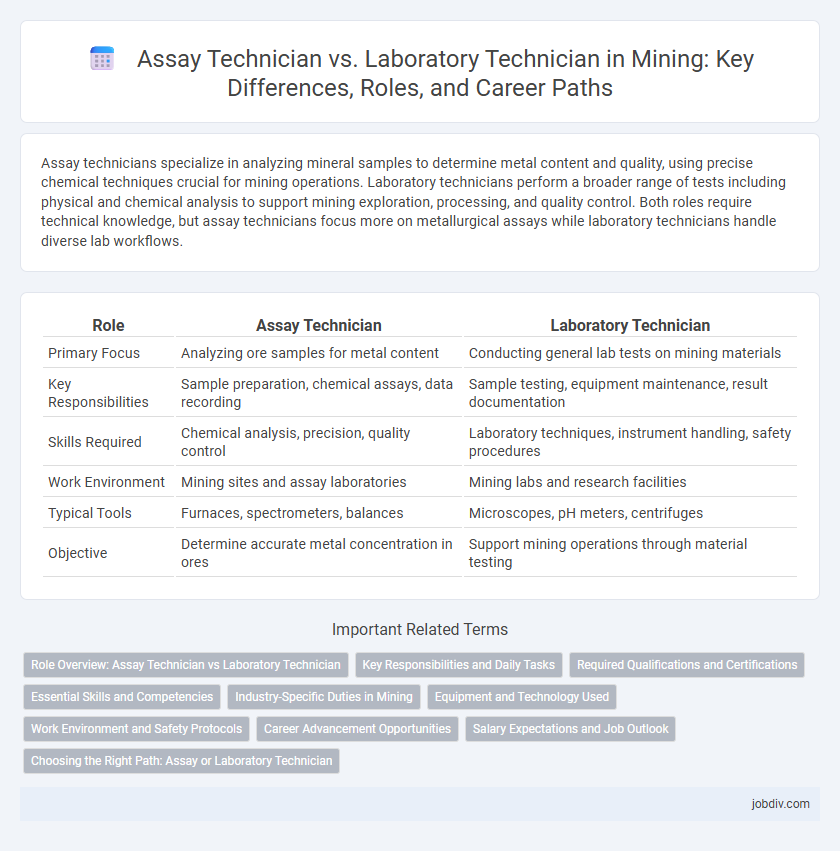Assay technicians specialize in analyzing mineral samples to determine metal content and quality, using precise chemical techniques crucial for mining operations. Laboratory technicians perform a broader range of tests including physical and chemical analysis to support mining exploration, processing, and quality control. Both roles require technical knowledge, but assay technicians focus more on metallurgical assays while laboratory technicians handle diverse lab workflows.
Table of Comparison
| Role | Assay Technician | Laboratory Technician |
|---|---|---|
| Primary Focus | Analyzing ore samples for metal content | Conducting general lab tests on mining materials |
| Key Responsibilities | Sample preparation, chemical assays, data recording | Sample testing, equipment maintenance, result documentation |
| Skills Required | Chemical analysis, precision, quality control | Laboratory techniques, instrument handling, safety procedures |
| Work Environment | Mining sites and assay laboratories | Mining labs and research facilities |
| Typical Tools | Furnaces, spectrometers, balances | Microscopes, pH meters, centrifuges |
| Objective | Determine accurate metal concentration in ores | Support mining operations through material testing |
Role Overview: Assay Technician vs Laboratory Technician
Assay Technicians specialize in analyzing ore samples to determine the metal content, using precise chemical and instrumental techniques essential for assessing mineral value. Laboratory Technicians perform a broader range of tests on mining materials, ensuring quality control and supporting exploration, extraction, and processing operations through diverse analytical methods. Both roles require strong attention to detail and rigorous adherence to safety and quality standards in mining laboratories.
Key Responsibilities and Daily Tasks
Assay Technicians specialize in analyzing ore samples to determine metal content, performing chemical assays, and ensuring accurate quantitative results critical for resource evaluation. Laboratory Technicians manage a broader range of sample preparations, equipment maintenance, and quality control processes within mining laboratories. Both roles require meticulous data recording and adherence to safety protocols but differ primarily in assay-specific chemical analysis versus general lab operations.
Required Qualifications and Certifications
Assay Technicians require specialized knowledge in chemical analysis and proficiency in techniques such as atomic absorption spectroscopy, often holding certifications like a Diploma in Metallurgical or Chemical Technology or relevant laboratory certifications. Laboratory Technicians typically possess qualifications in general science or laboratory technology, such as a Certificate III in Laboratory Skills, focusing on broader laboratory procedures including sample preparation and equipment maintenance. Both roles demand strict adherence to safety protocols and quality standards, but Assay Technicians require more in-depth expertise in mineral assay methods and analytical chemistry certifications.
Essential Skills and Competencies
Assay Technicians in mining require expertise in chemical analysis, precision in sample preparation, and proficiency with analytical instruments like atomic absorption spectrometers to determine ore composition accurately. Laboratory Technicians must demonstrate strong skills in quality control, equipment calibration, and data recording, ensuring consistent and reliable test results across various mineral samples. Both roles demand attention to detail, knowledge of safety protocols, and the ability to interpret technical data accurately for effective mineral assessment.
Industry-Specific Duties in Mining
Assay Technicians in mining specialize in analyzing ore samples to determine metal content and grade, ensuring accurate mineral valuation for efficient resource extraction. Laboratory Technicians manage sample preparation, chemical testing, and equipment calibration to support quality control and compliance with mining regulations. Both roles require precision and technical expertise but differ in focus: Assay Technicians concentrate on geochemical analysis, while Laboratory Technicians handle broader laboratory operations.
Equipment and Technology Used
Assay Technicians primarily utilize advanced analytical instruments such as atomic absorption spectrometers, X-ray fluorescence (XRF) analyzers, and inductively coupled plasma mass spectrometry (ICP-MS) to determine the composition and concentration of metal ores. Laboratory Technicians operate a broader range of equipment including centrifuges, microscopes, and general purpose chemical analyzers to support various testing procedures beyond mineral assays. Both roles require proficiency with laboratory information management systems (LIMS) to record and analyze data efficiently, but Assay Technicians focus more on precise metallurgical instrumentation specific to ore quality assessment.
Work Environment and Safety Protocols
Assay Technicians primarily operate in controlled laboratory settings where precision instruments and chemical reagents are handled, necessitating strict adherence to safety protocols such as proper chemical storage and use of personal protective equipment (PPE). Laboratory Technicians in mining environments often work with a broader range of samples, including soil and mineral concentrates, requiring rigorous contamination control and ventilation systems to manage dust and airborne particles. Both roles demand comprehensive safety training to prevent exposure to hazardous materials and ensure compliance with mining regulations and workplace safety standards.
Career Advancement Opportunities
Assay Technicians typically have specialized skills in chemical analysis and ore grade determination, which can lead to advanced roles such as Senior Assayer or Quality Control Supervisor in mining operations. Laboratory Technicians, with broader expertise in sample preparation and equipment maintenance, may progress to Laboratory Manager or Technical Specialist positions overseeing multiple testing protocols. Both career paths offer growth through certification, experience, and specialization in analytical techniques critical to mining efficiency and safety.
Salary Expectations and Job Outlook
Assay Technicians typically earn between $50,000 and $70,000 annually due to their specialization in analyzing ore and mineral samples for metal content, with job growth expected at 5% over the next decade because of ongoing demand in mining operations. Laboratory Technicians in mining labs average salaries from $45,000 to $65,000, performing broader testing on various geological materials, facing a similar job outlook driven by advancements in mining technology and quality control standards. Both roles require strong analytical skills, but Assay Technicians command slightly higher salaries due to their critical role in valuation and exploration processes.
Choosing the Right Path: Assay or Laboratory Technician
Choosing the right path between an Assay Technician and a Laboratory Technician in mining depends on your interest and skills in mineral analysis and sample preparation. Assay Technicians specialize in precise chemical testing to determine the composition and quality of ore, crucial for valuation and extraction decisions. Laboratory Technicians manage broader lab operations, including equipment maintenance, data recording, and supporting multiple testing processes to ensure accurate and timely results.
Assay Technician vs Laboratory Technician Infographic

 jobdiv.com
jobdiv.com